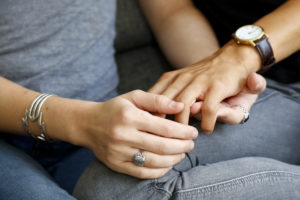When you or a loved one has been injured, navigating the civil justice system without a lawyer can be nearly impossible. While, thankfully, society has come a long way in only a few years, too often legal resources for non-lawyers cater to CIS/heteronormative experiences. “Straight” lawyers, law professors, judges, and legislators still dominate the legal profession, and don’t always have the perspective or empathy to understand sexual or gender minority issues.
Fortunately, LGBTQ+ injury victims and their spouses have the same fundamental rights as everyone else. However, every case requires special consideration of the unique circumstances of those involved. When those circumstances involve LGBTQ+ status, a one-size-fits-all approach will not suffice. (Contact our attorneys about your case – The consultation is 100% free)
Spousal and family rights
 As human beings, we rely on our loved ones for comfort and support. When someone is injured, the impact can ripple through a family. The worry and anxiety of watching a spouse, parent, child, sibling, or other loved one in pain can be significant and devastating. Often an injury can also demonstrate just how much we may rely on a loved one for financial support, physical support and care and comfort. When a loved one is injured, fears of how it might affect other family members financially are real and justified.
As human beings, we rely on our loved ones for comfort and support. When someone is injured, the impact can ripple through a family. The worry and anxiety of watching a spouse, parent, child, sibling, or other loved one in pain can be significant and devastating. Often an injury can also demonstrate just how much we may rely on a loved one for financial support, physical support and care and comfort. When a loved one is injured, fears of how it might affect other family members financially are real and justified.
No matter what someone’s sexual orientation or gender identity is, an injury is emotionally and physically debilitating. Historically, however, injured sexual and gender minorities were treated differently than CIS/straight persons and their families. Not very long ago, sodomy laws, “anti-gay laws” and other laws criminalized LGBTQ+ existence and relationships. As a result, when one member of a same-sex couple was injured, bigoted parents and other family members could prevent the spouse from seeing their loved ones and freeze the spouse out of decisions about the injured person’s health, finances, and affairs. As more and more Americans demanded LGBTQ+ rights, politicians proposed compromises, catering to conservatives by depriving full marital rights, but offering “domestic partnership” as a legal alternative to appease LGBTQ+ persons and allies. Those marriage alternatives conferred some benefits, but often deprived LGBTQ+ people of other fundamental rights.
Thankfully, though the legal system remains imperfect, our laws no longer treat LGBTQ+ community members differently than their heterosexual counterparts. After the Supreme Court struck down laws criminalizing same-sex relationships and made same-sex marriage legal, married LGBTQ+ couples are afforded the same rights as their CIS/heteronormative peers. Those rights include the following:
Healthcare decisions
If an injury victim becomes incapacitated due to an injury, their married spouse is often empowered to make healthcare decisions. That means estranged parents can no longer elbow-out same-sex spouses and make healthcare decisions the injury victim would not have wanted.
Of course, as with straight married couples, being married does not require that a victim’s spouse make all decisions. Estate planning such as a “health care directive” can take the guess work out of determining what treatment an injury victim would’ve wanted. Alternatively, victims can give someone else “power of attorney” to make treatment and other decisions for them while they are recovering.
Spousal Privilege

Loss of consortium
When someone is injured, their spouse suffers consequences too. Some of those losses might seem relatively trivial: an injury victim can no longer mow the yard, so their spouse has to pick up the slack. But injuries can profoundly disrupt a relationship. Injuries can keep couples apart, physically and emotionally, and can lead to a loss of companionship, affection, comfort, and support. They can put a strain the relationship, change the quality of the union, and can prevent or hinder intimacy. When that happens, the spouse has a claim to be compensated for their losses, too. Sometimes, other family members (including children) will have a similar derivative ‘loss of consortium’ claim. Usually, the claim must be brought at the same time as the injury victim’s claim and isn’t viable as a stand-alone case.
Minor (child) settlements
The law recognizes the legitimacy of same-sex and non-binary parenthood. LGBTQ+ parents have the same rights as CIS/heteronormative parents have with respect to their children. That means LGBTQ+ parents have the authority to act as decision-makers for their injured children when it comes to pursuing compensation. Like non-LGBTQ+ parents, the settlement of a child’s case will usually require the approval of a local court. And when an adoption is involved LGBTQ+ parents should not have to worry that birth parents who have had no meaningful involvement in a child’s life will displace them and pursue their own interests at the expense of the injured child’s rights.
However, someone’s legal status as a parent or child can depend on certain formalities and proceedings that are tangential to a personal injury case. A knowledgeable lawyer can help you navigate these formalities to ensure LGBTQ+ parents have the legal authority to protect their child’s interests.
Wrongful death
The worst consequence of an injury is the loss of a loved one. It used to be that a same-sex loved one could be excluded from a claim for wrongful death damages. Thankfully, that is no longer the case. In fact, most states give priority to the spouse over parents and siblings. So estranged family members can no longer exacerbate the pain of losing a companion by excluding you from your spouse’s estate.
As with non-LGBTQ+ relationships, these rights often don’t apply to non-married spouses or informal parental arrangements. There are some exceptions, however, depending on the laws of the state where the victim lives or where the injury occurred. Some states confer spousal rights on “domestic partners” (i.e. people who live together and share their lives but are not formally married), or ease the requirements for an adult to act as a legal representative for an injured child. Understanding your rights will require a detailed analysis of the laws of your state and the facts surrounding your interpersonal relationships.
Challenges for same sex couples
While the law no longer explicitly discriminates against sexual and gender minorities, bigots do not give up easily. Even in the 21st century, extremists are still looking for ways to limit LGBTQ+ rights. With a conservative majority on the Supreme Court, our rights sit on a precarious ledge.

Good lawyers will also point out to fact finders that a wrongful act is wrong regardless of who the victim is. Many people are closed-minded, but only the most hateful person would believe it’s okay to needlessly harm someone simply because of their sexual or gender identity or the LGBTQ+ status of their families.
Of course, for those who choose to keep their gender and sexual minority status private, the process of pursuing your claims can affect your privacy. In order to respond and prepare for potential bias, your lawyer must know about you and your spouse’s LGBTQ+ status. A lawyer who doesn’t know about the person or people you love will not be able to gather powerful evidence about the harms and losses victims’ spouses witness every day. Further, defendants can try to use closeted LGBTQ+ status to “out,” harass, or disparage a victim or their loved ones. If your lawyer understands your LGBTQ+ status, that lawyer can take steps to prevent needless embarrassment or harassment. That’s why it’s important to be forthright and completely honest with your lawyer about your LGBTQ+ status. Remember, your lawyer has a confidential relationship with you, meaning no one else can compel you or your lawyer to disclose what you discussed in private.